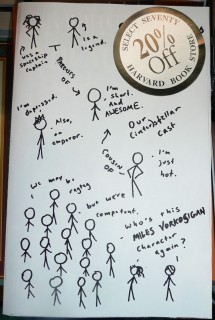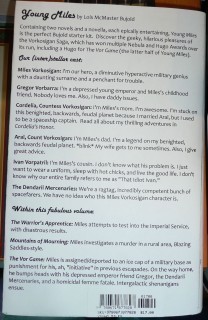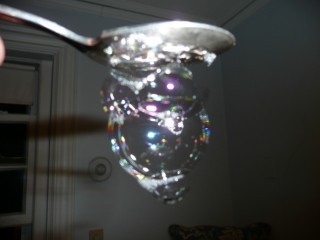Greer Gilman's Blog, page 90
May 20, 2011
"And great shall be the tumult thereof, I should think."
Published on May 20, 2011 20:44
May 15, 2011
"...to wound the autumnal city..."
Fortunately, I was back in town just in time to catch Bellona, Destroyer of Cities, Jay Scheib's mindblowing transformation of Samuel R. Delany's Dhalgren (1975), with a conversation afterward between both artists.
![[info]](https://i.gr-assets.com/images/S/compressed.photo.goodreads.com/hostedimages/1380451598i/2033940.gif) sovay
has written a far more thoughtful review of the play and performances. I just have a few notes on the production. It rocked.
sovay
has written a far more thoughtful review of the play and performances. I just have a few notes on the production. It rocked.
(The 95-year-old grandmother of the stage manager was sitting behind me--she'd been at the rehearsals, and was a serious fan of this production--and I turned around afterward and praised her granddaughter to the skies.)
The back wall of the set was glass, a window on the harbor at nightfall. Bellona framed Boston jaggedly; or maybe Boston enfolded Bellona like a matryoshka.
I really liked the use of video projection in this, three stacked images, bannered boldly front and center. It made what was going on onstage--distant, offhand, more-or-less linear--into something contingent and iconic. A lot of the staging was covert, played turned from the audience, or halfway through a door: in the bathroom, or on a mattress way upstage, almost in the wings. The video everted--almost exploded--the action, refracted it. Out-tesseracted. What passes on a stage, of necessity, is in distant third person. This play projected multiple points of view--first, second, third--in dizzying simultaneity. It put the furtive in your face; made shards of private grief or ecstasy both huge and evanescent.
It was theatre as streaming anamorphic art. I'd never imagined that. I kept thinking, Wow. How could I do this in writing?
And I liked the meta-theatrics. All the actors fly the astronaut, like children playing with a clumsy action figure; what the screen shows is her helmeted face, in spacewalk awe and joy. At one point, Kid (gender-bent in this production, played by an actress) sits down on the toilet (offstage, onscreen) and we hear an intermittent stream and tinkling. Cut to another actor pouring water from glass to glass. She begins to speak with Kid, and it becomes a conversation with a therapist. Elsewhere in time, a death scene, a fall, is ritually constructed: the actor flings himself down; others bring rubble to lay on him, and lave him with blood. It's as if the rites of burial ("her virgin crants / Her maiden strewments") were back-mirrored to the death itself.
And only at the very end do the actors in themselves become iconic. Kid's successor, the child of her/his body, walks gravely to the stage, and an actor shinnies up the rigging like a circus performer, to a perilous height: starward, still in smoke.
Nine
![[info]](https://i.gr-assets.com/images/S/compressed.photo.goodreads.com/hostedimages/1380451598i/2033940.gif) sovay
has written a far more thoughtful review of the play and performances. I just have a few notes on the production. It rocked.
sovay
has written a far more thoughtful review of the play and performances. I just have a few notes on the production. It rocked.(The 95-year-old grandmother of the stage manager was sitting behind me--she'd been at the rehearsals, and was a serious fan of this production--and I turned around afterward and praised her granddaughter to the skies.)
The back wall of the set was glass, a window on the harbor at nightfall. Bellona framed Boston jaggedly; or maybe Boston enfolded Bellona like a matryoshka.
I really liked the use of video projection in this, three stacked images, bannered boldly front and center. It made what was going on onstage--distant, offhand, more-or-less linear--into something contingent and iconic. A lot of the staging was covert, played turned from the audience, or halfway through a door: in the bathroom, or on a mattress way upstage, almost in the wings. The video everted--almost exploded--the action, refracted it. Out-tesseracted. What passes on a stage, of necessity, is in distant third person. This play projected multiple points of view--first, second, third--in dizzying simultaneity. It put the furtive in your face; made shards of private grief or ecstasy both huge and evanescent.
It was theatre as streaming anamorphic art. I'd never imagined that. I kept thinking, Wow. How could I do this in writing?
And I liked the meta-theatrics. All the actors fly the astronaut, like children playing with a clumsy action figure; what the screen shows is her helmeted face, in spacewalk awe and joy. At one point, Kid (gender-bent in this production, played by an actress) sits down on the toilet (offstage, onscreen) and we hear an intermittent stream and tinkling. Cut to another actor pouring water from glass to glass. She begins to speak with Kid, and it becomes a conversation with a therapist. Elsewhere in time, a death scene, a fall, is ritually constructed: the actor flings himself down; others bring rubble to lay on him, and lave him with blood. It's as if the rites of burial ("her virgin crants / Her maiden strewments") were back-mirrored to the death itself.
And only at the very end do the actors in themselves become iconic. Kid's successor, the child of her/his body, walks gravely to the stage, and an actor shinnies up the rigging like a circus performer, to a perilous height: starward, still in smoke.
Nine
Published on May 15, 2011 11:13
May 13, 2011
Landvaettir
A friend of mine is looking for a good call name for an Icelandic Sheep Dog puppy. (Still with his dam: he's barely two weeks old. Aww.) The litter was four boys, so their kennel names are after the four protectors of Iceland, the Landvaettir: Griðungur, Gammur, Dreki, and Bergrisi. The call name can be anything Icelandic, but she likes two syllables. Says they carry better.
Any ideas?
Nine
Any ideas?
Nine
Published on May 13, 2011 20:12
May 12, 2011
"Do bats eat cats?"
You know that jar you get when the step isn't there? Well, I habitually pick up whatever book's nearest to hand, and read a page or two at random. The book I set down was Quentin Crisp's The Naked Civil Servant; the book I picked up was E. M. Delafield's The Provincial Lady in London. And I read half a page before I realized that he was she, and the holiday tutor she was interviewing wasn't a pickup.
Miss the step, down the rabbit hole, and jars of marmalade all the way down.
What other pairs of books could you misread this way?
Nine
Miss the step, down the rabbit hole, and jars of marmalade all the way down.
What other pairs of books could you misread this way?
Nine
Published on May 12, 2011 17:25
May 10, 2011
"There was no nonsense about Pure Science with Edith..."
"...she liked working towards a prescribed practical end."
Two girls are playing with a toy theatre:
Edith, who moved the paste-board figures about under Jane's supervision, said one day (it was the summer of 1923), 'Wouldn't it be more fun to have these people moving by themselves, instead of having to shove one's hand in among them? And speaking for themselves, too?'
Jane said, 'Oh, marionettes! You can't do much with them, and the movements are so jerky. And the strings are the devil to manipulate. And ventriloquism is just like bad acting.'
Edith explained: 'No, I meant robots—life-sized robots, probably of rubber and steel, controlled by wireless and activated by this new phototropic principle—you know, it's derived from a study of how moths' wings react to candle-light. It ought to be possible. And no need for ventriloquism, either. With wirelessed gramophone records you could make them really talk. But they'd have to move their lips in a convincing way and be able to dance about rubberily. I'd love to try it. You could even get on the stage and act along with them. There would have to be two sets of robots, one life-size and the other a tiny set attached to a sort of keyboard. Someone behind the stage would manipulate the tiny set by touching various buttons and switches on the keyboard, and the big set would respond sympathetically. There would have to be what is called "sensitivity-locuses" on their joints: the relation of the sensitivity-locuses would be what counted. Facial expressions would be complicated: to work out the proper position for each facial locus and find different formulas for, say, a scowl or a leer or a grin would take a lot of doing. But nothing's impossible. And all the voicing could be yours—I have found out an amusing way of converting a woman's voice on the gramophone into a man's. You could sing choruses with yourself—in soprano, contralto, tenor and bass.'
'You're quite mad,' said Jane. 'But I give you leave to try. If you get any sort of results I'll take you into partnership and we'll make our fortunes.'
If there were a Bechdel Test for fiction, I'd give this an A. Who do you think wrote it? And when? (If you know, don't tell yet.)
Nine
Two girls are playing with a toy theatre:
Edith, who moved the paste-board figures about under Jane's supervision, said one day (it was the summer of 1923), 'Wouldn't it be more fun to have these people moving by themselves, instead of having to shove one's hand in among them? And speaking for themselves, too?'
Jane said, 'Oh, marionettes! You can't do much with them, and the movements are so jerky. And the strings are the devil to manipulate. And ventriloquism is just like bad acting.'
Edith explained: 'No, I meant robots—life-sized robots, probably of rubber and steel, controlled by wireless and activated by this new phototropic principle—you know, it's derived from a study of how moths' wings react to candle-light. It ought to be possible. And no need for ventriloquism, either. With wirelessed gramophone records you could make them really talk. But they'd have to move their lips in a convincing way and be able to dance about rubberily. I'd love to try it. You could even get on the stage and act along with them. There would have to be two sets of robots, one life-size and the other a tiny set attached to a sort of keyboard. Someone behind the stage would manipulate the tiny set by touching various buttons and switches on the keyboard, and the big set would respond sympathetically. There would have to be what is called "sensitivity-locuses" on their joints: the relation of the sensitivity-locuses would be what counted. Facial expressions would be complicated: to work out the proper position for each facial locus and find different formulas for, say, a scowl or a leer or a grin would take a lot of doing. But nothing's impossible. And all the voicing could be yours—I have found out an amusing way of converting a woman's voice on the gramophone into a man's. You could sing choruses with yourself—in soprano, contralto, tenor and bass.'
'You're quite mad,' said Jane. 'But I give you leave to try. If you get any sort of results I'll take you into partnership and we'll make our fortunes.'
If there were a Bechdel Test for fiction, I'd give this an A. Who do you think wrote it? And when? (If you know, don't tell yet.)
Nine
Published on May 10, 2011 10:50
May 8, 2011
"The princesses had been dancing..."

These were in the old pine cabinet in the hall outside my mother's bedroom, along with a portrait of Erich von Stroheim, taken by my stepfather.
Story?
Nine
Published on May 08, 2011 19:31
May 6, 2011
Nailed the bastard!
No, not him. But the Geiers, pere et fils, the Duke and Earl of autism quackery, and the sole purveyors of the Lupron Protocol, are in trouble in Maryland.. Huzzah! That's only one of the eight or nine states they malpractice in, but the elder Geier has had his license revoked, and the younger (who has no medical degree) has been pulled as diagnostician [!] for the state Autism Commission. I want jail time.
What they do, stripped of all self-righteous jargon, is chemically castrate children. Makes 'em docile. Of course, that's not how they sell it. On their earth--a moon of Planet Wakefield--autism is mercury poisoning, caused by the microdrop of thimerosol that stopped being in some vaccines (and never was in the MMR) over a decade ago. There's a huge business in faking-up scary mercury levels and prescribing purges. Chelation is nothing to trifle with, even in genuine cases of heavy-metal poisoning: the risks include "bone marrow suppression, shock, low blood sugar, convulsions, cardiac arrhythmias, respiratory arrest, and liver and kidney failure." At least one child has died of it.
The Geiers take that one step further. Testosterone, they say, binds strongly to mercury. (Which it does--in a solution of very hot benzene. I told you they aren't from this planet.) Therefore, to shake loose the non-existent mercury, in order for the chelating drugs to purge it, one must nuke the testosterone. There's a powerful drug for that: Lupron, which is used to castrate sexual offenders. (They would, O god of numbers, have used it on Turing, if they'd had him.) The shots are excruciating; the effects on pre-pubescent and pubescent children, incalcuable.
This is an atrocity.
And flat-out fraud. In order to get the Lupron, the Geiers tell insurers that these patients have "precocious puberty," a real but rare condition. That's what they tell the parents, too, painting lurid pictures of uncontrolled animal lust and aggression. (Their contempt for the children reeks.) After all, the bastards need to scare $5 or $6,000 a month out of desperate people, just for the meds. I think the Geiers know damned well they're lying. Many of their patients are too old for the diagnosis--hell, they've created menopausal twelve-year-olds. There is a protocol of tests for the genuine condition--including scans for brain tumors--which they don't do, beyond some diagnostic groping. On one nine-year-old boy's chart, the elder Geier wrote "very well endowed."
The abuses are staggering.
But their lawyer knows better: "If you read the [order], you say, 'Holy God, this is awful.' But if it were so awful, they'd have an injured child, and they don't."
Nine
What they do, stripped of all self-righteous jargon, is chemically castrate children. Makes 'em docile. Of course, that's not how they sell it. On their earth--a moon of Planet Wakefield--autism is mercury poisoning, caused by the microdrop of thimerosol that stopped being in some vaccines (and never was in the MMR) over a decade ago. There's a huge business in faking-up scary mercury levels and prescribing purges. Chelation is nothing to trifle with, even in genuine cases of heavy-metal poisoning: the risks include "bone marrow suppression, shock, low blood sugar, convulsions, cardiac arrhythmias, respiratory arrest, and liver and kidney failure." At least one child has died of it.
The Geiers take that one step further. Testosterone, they say, binds strongly to mercury. (Which it does--in a solution of very hot benzene. I told you they aren't from this planet.) Therefore, to shake loose the non-existent mercury, in order for the chelating drugs to purge it, one must nuke the testosterone. There's a powerful drug for that: Lupron, which is used to castrate sexual offenders. (They would, O god of numbers, have used it on Turing, if they'd had him.) The shots are excruciating; the effects on pre-pubescent and pubescent children, incalcuable.
This is an atrocity.
And flat-out fraud. In order to get the Lupron, the Geiers tell insurers that these patients have "precocious puberty," a real but rare condition. That's what they tell the parents, too, painting lurid pictures of uncontrolled animal lust and aggression. (Their contempt for the children reeks.) After all, the bastards need to scare $5 or $6,000 a month out of desperate people, just for the meds. I think the Geiers know damned well they're lying. Many of their patients are too old for the diagnosis--hell, they've created menopausal twelve-year-olds. There is a protocol of tests for the genuine condition--including scans for brain tumors--which they don't do, beyond some diagnostic groping. On one nine-year-old boy's chart, the elder Geier wrote "very well endowed."
The abuses are staggering.
But their lawyer knows better: "If you read the [order], you say, 'Holy God, this is awful.' But if it were so awful, they'd have an injured child, and they don't."
Nine
Published on May 06, 2011 22:16
May 2, 2011
Intergalactic shenanigans ensue
I love the Harvard Book Store. They loathed the cover of Bujold's new book (with reason), so they designed and printed up a new one. Then they took the whole great stack, and reupholstered it.



Nine



Nine
Published on May 02, 2011 22:28
May 1, 2011
Rise up, the children of this house
Early early this morning I made a proper pot of tea, just as
![[info]](https://i.gr-assets.com/images/S/compressed.photo.goodreads.com/hostedimages/1380451598i/2033940.gif) madamebuttery
liked it: a brown Rockingham teapot, well-warmed; a spoonful for each cup, and one more, of Yorkshire Gold. Then I poured it out, with milk and sugar, into an Actor's Shakespeare Project thermos, and
madamebuttery
liked it: a brown Rockingham teapot, well-warmed; a spoonful for each cup, and one more, of Yorkshire Gold. Then I poured it out, with milk and sugar, into an Actor's Shakespeare Project thermos, and
![[info]](https://i.gr-assets.com/images/S/compressed.photo.goodreads.com/hostedimages/1380451598i/2033940.gif) negothick
and I took it through the bird-charmed perfect dawning to the riverbank.
negothick
and I took it through the bird-charmed perfect dawning to the riverbank.
Her bench is there. She wanted it just by the bridge, where she could watch the morris dancing and the rites of May, as she had done each spring for almost forty years. I like to think that lovers will meet there and comic poets scrawl; that the puzzled will find ways to fix things, and the sad take heart.
A knot of us who loved her dearly poured libations of the tea about the bench, and drank there to her memory.
By then, the bells were stirring and the sun rose up. We joined the dance.
Dum possumus, vivamus : Let us live while we May.
Nine
![[info]](https://i.gr-assets.com/images/S/compressed.photo.goodreads.com/hostedimages/1380451598i/2033940.gif) madamebuttery
liked it: a brown Rockingham teapot, well-warmed; a spoonful for each cup, and one more, of Yorkshire Gold. Then I poured it out, with milk and sugar, into an Actor's Shakespeare Project thermos, and
madamebuttery
liked it: a brown Rockingham teapot, well-warmed; a spoonful for each cup, and one more, of Yorkshire Gold. Then I poured it out, with milk and sugar, into an Actor's Shakespeare Project thermos, and
![[info]](https://i.gr-assets.com/images/S/compressed.photo.goodreads.com/hostedimages/1380451598i/2033940.gif) negothick
and I took it through the bird-charmed perfect dawning to the riverbank.
negothick
and I took it through the bird-charmed perfect dawning to the riverbank.Her bench is there. She wanted it just by the bridge, where she could watch the morris dancing and the rites of May, as she had done each spring for almost forty years. I like to think that lovers will meet there and comic poets scrawl; that the puzzled will find ways to fix things, and the sad take heart.
A knot of us who loved her dearly poured libations of the tea about the bench, and drank there to her memory.
By then, the bells were stirring and the sun rose up. We joined the dance.
Dum possumus, vivamus : Let us live while we May.
Nine
Published on May 01, 2011 19:59
April 30, 2011
We are bubbles of spoon!


The olive fork is an excellent straightforward bubble wand; but the tomato spoon does baroque things out of Engine Summer.
With thanks to
![[info]](https://i.gr-assets.com/images/S/compressed.photo.goodreads.com/hostedimages/1380451598i/2033940.gif) vr_trakowski
.
vr_trakowski
.Nine
Published on April 30, 2011 19:46
Greer Gilman's Blog
- Greer Gilman's profile
- 42 followers
Greer Gilman isn't a Goodreads Author
(yet),
but they
do have a blog,
so here are some recent posts imported from
their feed.



